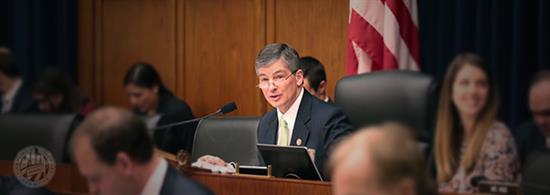Hensarling Delivers Opening Statement at Committee Markup
Washington,
January 17, 2018
House Financial Services Committee Chairman Jeb Hensarling (R-TX) delivered the following opening statement as the committee began consideration of 17 measures on Wednesday: 2017 was one of the most productive years on record for this committee. 12 full committee hearings, 54 subcommittee hearings, 7 markups, 76 bills reported to the House, 36 bills passed, and 6 bills signed into law. None of this would have been possible without members on both sides of the aisle who continue to take their ideas and turn it into positive legislation for the American people. I want to thank all the members for their hard work. 2017 was also a fruitful year for America’s economy, with the stock market up more than 20%, back-to-back quarters of 3 percent growth – something we have not seen in quite some time – 1.8 million jobs created, and more than $5 trillion of new wealth created. And all of that was before the President signed The Tax Cut & Jobs Act into law. This historic legislation – which overhauled America’s tax code and delivered historic tax relief to all people of all walks of life – will benefit hardworking individuals, families, and job creators while providing economic growth for all. Indeed, before the ink was dry on the President’s signature, we began to see the benefits of this legislation. Fifth Third Bancorp is giving its employees a $1,000 bonus and raising its minimum wage to $15 an hour, which alone will increase paychecks for nearly 3,000 workers. Navient is giving $1,000 bonuses to all non-officer employees, which is 98 percent of its total workforce. Fiat Chrysler announced a $1 billion investment to revamp its Michigan assembly plant, the addition of 2,500 new jobs, and a $2,000 bonus to 60,000 U.S. workers. Once again, all courtesy of the tax plan. Nephron Pharmaceuticals and Nexus are both giving their employees a 5 percent wage increase. PNC Bank is giving $1,000 bonuses to its employees and $1,500 increase to workers’ existing pension accounts. Washington Federal is giving all employees earning less than $100,000 a 5 percent wage increase. This is making a real difference in the lives of working Americans. Wells Fargo is increasing its minimum wage to $15 an hour. And my local hometown companies of AT&T and American Airlines are giving employees a $1,000 bonus. Walmart – the nation’s largest retail employer – is increasing its minimum wage to $11 an hour, expanding its maternal and paternal leave benefits, and providing bonuses to its employees. Again, all courtesy of the Republican tax plan signed into law by President Trump. These are just a fraction of the companies across the country that are rewarding their employees because of tax relief they will receive—and the list grows every day. In addition to the bonuses and increased wages employers are providing, the Treasury Department announced last week that an estimated 90 percent of American workers will see a boost in their take home pay starting in February. Let me repeat that, according to Treasury, 90 percent of all American workers will now see a boost in their take home pay starting in February as the tax tables are changed. Now, while this may be considered “crumbs,” or “pathetic” to some, it is real money to the nearly half of Americans who are literally living paycheck to paycheck and have, at best, a $400 cushion. But again, we cannot stop here on these improvements in the economy. Even as tax reform is massively boosting our economy, regrettably excessive regulation will continue to clog the arteries and prevent the free flow of capital that is the lifeblood of economic growth. So to realize the full potential of our economic strength, Congress must do more to reduce the burdensome and often unnecessary red tape that prevents companies from growing and creating more and better jobs and those regulatory burdens that hinder Main Street financial institutions from serving their customers with greater credit opportunities to fuel the type of economic growth I just alluded to. The bills we consider today will help to lift this regulatory burden. These bills will provide relief to community financial institutions so they can better serve their customers. They will increase investment opportunities for America. They will ease regulations to allow Americans to achieve the dream of homeownership. They will protect customer’s personal financial information, and they will help develop a national strategy to combat financial networks of transnational criminal organizations. Indeed, each of the 17 bills we consider today are great pieces of legislation that will make America stronger and more prosperous and I wish to thank the sponsors and co-sponsors for bringing them here today. |


